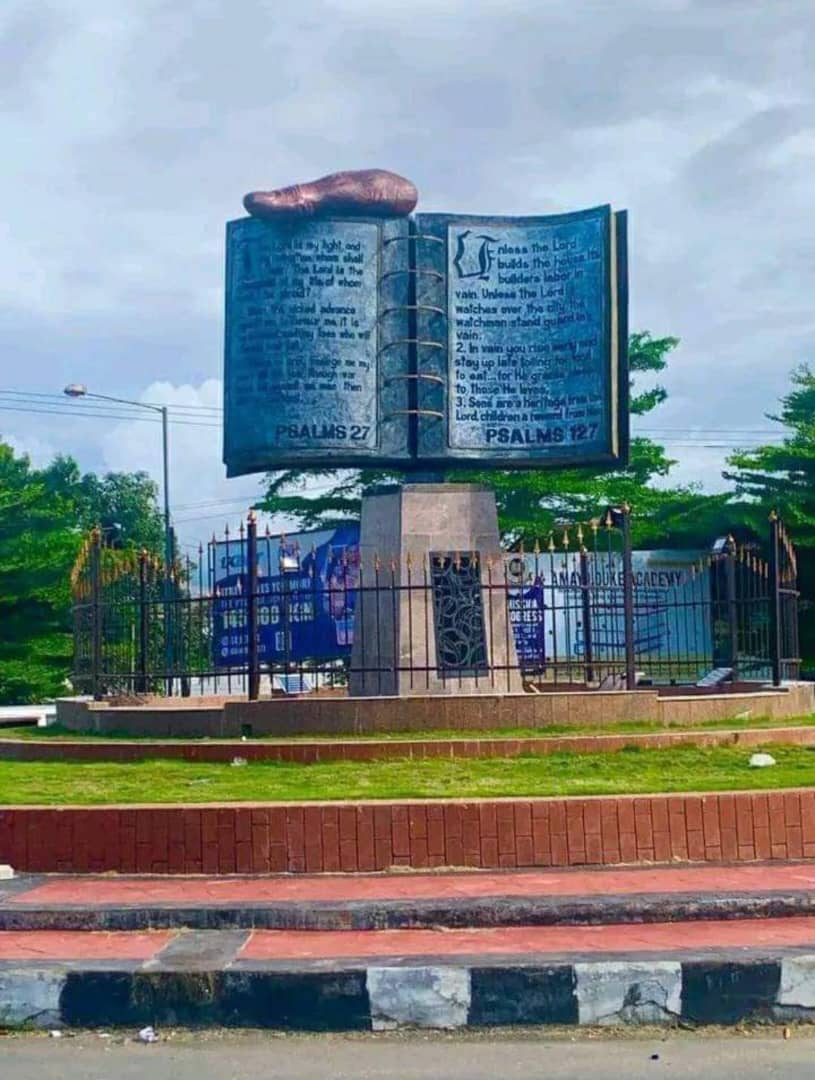The Eleven-Eleven roundabout in Calabar, Cross River State was named after Armistice Day when World War I (1914-1918) ended at the 11th hour on the morning of the 11th day in the 11th month of 1918.
The Eleven Eleven Roundabout which was built by the Mr. Donald Duke administration and had on its sides features that resemble Egyptian burial vaults, (mummies) was reworked in 2009 to remove those images which church leaders and most residents complained gave the impression that the State worships idols and replaced them with a water fountain. But in November of 2012, it was torn apart again and reworked without much change to the previous one. Now Governor Otu has again, brought the roundabout down and replaced it with a statue carrying the Holy Bible with quotations from Psalms 27 and Psalms 127 with embedded fingers.
This is worrying for me and I will express my worries. I have never lived in Calabar since I was born, but I know Calabar well enough to understand that the continued remodeling of this roundabout isn’t born out of a desire to give the State capital any enduring aesthetic value but to draw attention to the parochial convictions of the remodelers.
The current statue now standing there, only depicts the religious persuasions and views of the current occupant of Peregrino House. No more, no less. But our people must be weary of governments that want to railroad religion as a State policy and there are historical reasons and empirical data to support this warning.
A century ago, Durkheim proposed that technological and socioeconomic advances come to displace the functions of religion: (É Durkheim, (The Elementary Forms of Religious Life, K.E. Fields, Transl. (The Free Press, 1995). Whereas Weber contended the opposite, that monotheistic religion or the so-called ‘Protestant Ethic’, made the development of capitalism possible. (Weber, The Protestant Ethic and the Spirit of Capitalism, T. Parsons, Transl. (Routledge Classics, 2001).
However, data generated from recent and continuing research is interestingly revealing that the growth in irreligiosity in any country is linked to economic progress. There are several studies that espouse this conclusion. One such study comes from the University of Bristol, (https://www.science.org/doi/10.1126/sciadv.aar8680), where researchers studied the trends in secularization for 100 years and determined that growth in secularism came before economic development. The researchers sought to answer the question of whether a boost in a nation’s economic development leads to lesser religiosity or if it’s the other way around. They discovered that secularization did account for 40% of global economic development in the 1990s. Additionally, they also disproved the commonly held belief that education also leads to secularism.
Another research from Mississippi State University and West Virginia University (https://www.cambridge.org/core/journals/journal-of-institutional-economics/article/abs/religion-productive-or-unproductive/4E84A5F30B499BE751E478DFC1305B12) also looks at the link between irreligion and productive entrepreneurship. Stunningly, the researchers found that all metrics of religion that they had tracked ended up negatively correlating with productive entrepreneurship, while irreligious variables positively correlated with it.
Further expanding on this, and taking a look at the correlation of daily prayers with a nation’s gross domestic product per capita (GDP per capita), the data reveals that, in nearly every country (except Middle Eastern states that were not part of the sample), with a GDP per capita higher than $30,000, adults pray less. For instance, the People’s Republic of China’s religiously unaffiliated population is 51.8% but China is the world’s largest economy in purchasing power parity terms.
This brings us back to my warning. Let us all be mindful of the fact that the use of religion as a political tool to hoodwink Nigerians is legendary amongst our leaders. In the absence of meaningful economic development, our leaders have successfully waved religion as a succor to numb our collective thinking faculties and this has worked for them in the past decades. The duty of the State is to give us security and economic empowerment. Religion can be left to those who are meant to handle it. And I will tell you for free that the next Governor of Cross River State after Governor Otu, will still dismantle Eleven Eleven roundabout and waste more money to espouse his/her own belief.
Citizen Agba Jalingo is the Publisher of CrossRiverWatch and a rights activist, a Cross Riverian, and writes from Lagos.
NB: Opinions expressed in this article are strictly attributable to the author, Agba Jalingo, and do not represent the opinion of CrossRiverWatch or any other organization the author works for/with.
Since You Are Here, Support Good JournalismCrossRiverWatch was founded on the ideals of deploying tech tools to report in an ethical manner, news, views and analysis with a narrative that ensures transparency in governance, a good society and an accountable democracy. Everyone appreciates good journalism but it costs a lot of money. Nonetheless, it cannot be sacrificed on the altar of news commercialization. Consider making a modest contribution to support CrossRiverWatch's journalism of credibility and integrity in order to ensure that all have continuous free access to our noble endeavor. CLICK HERE |
New Feature: Don't miss any of our news again.Get all our articles in your facebook chat box.Click the Facebook Messenger Icon below to subscribe now
Text Advert by CRWatch :Place Yours

Will You To Learn How To Make Millions Of Naira Making Special Creams From Your Kitchen?.Click Here
Expose Your Business And Make More Sales. Advertise On CrossRiverWatch.com Today



Leave feedback about this